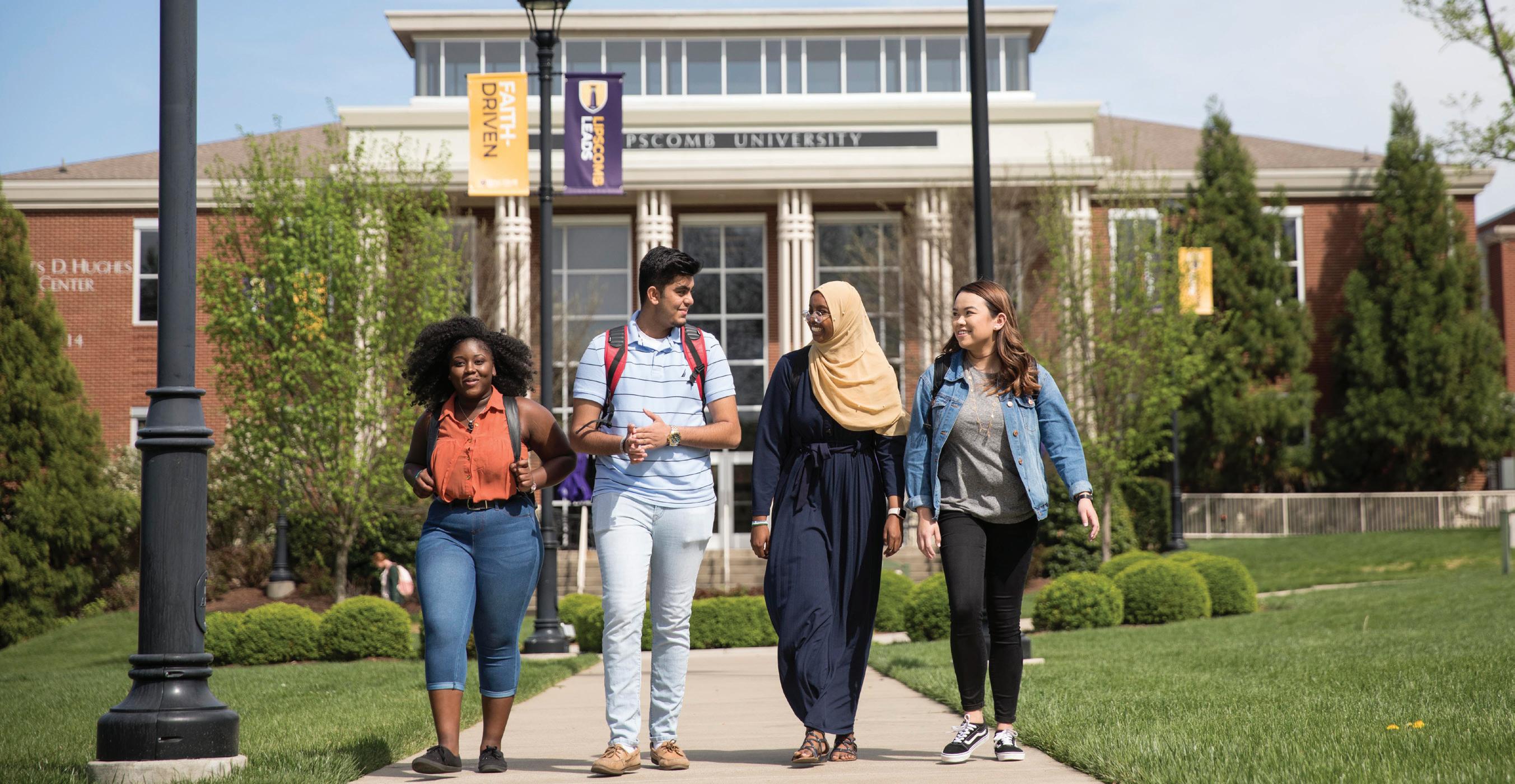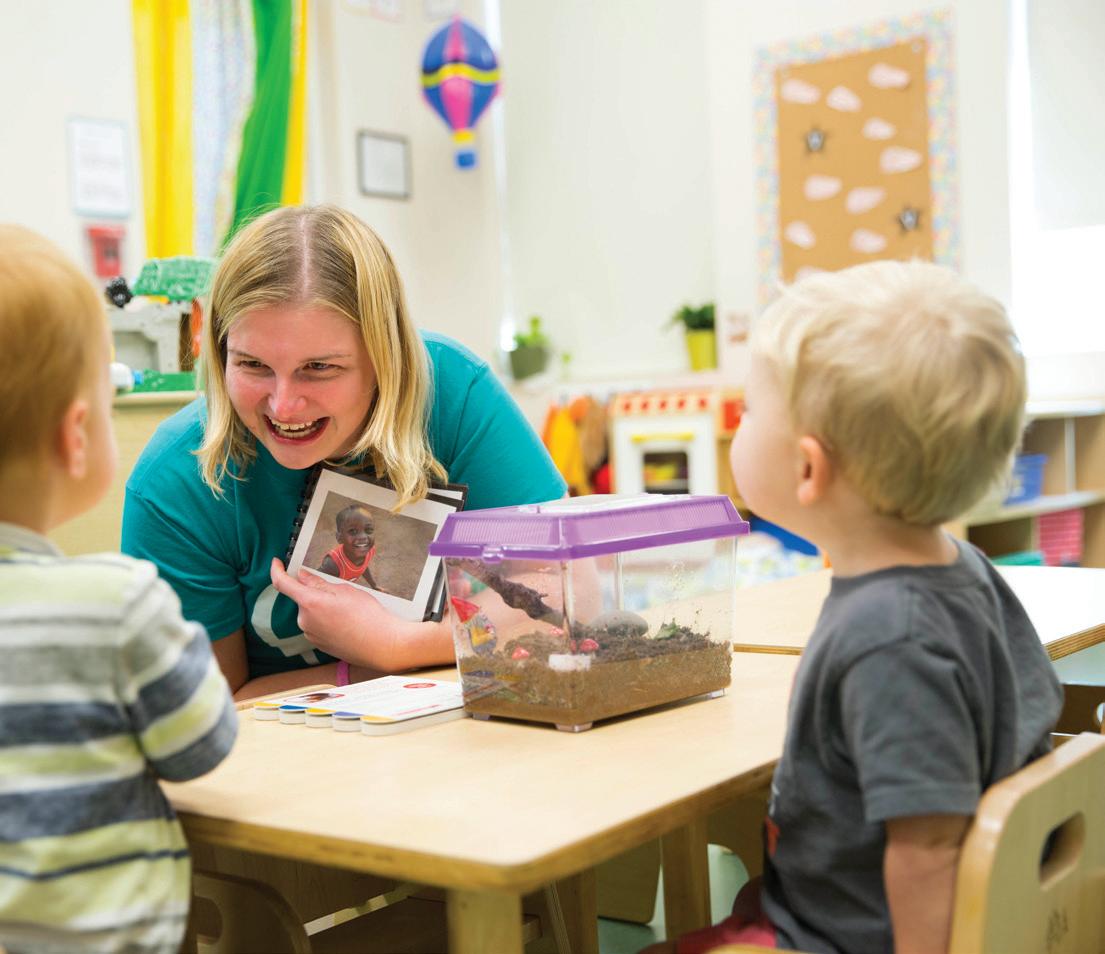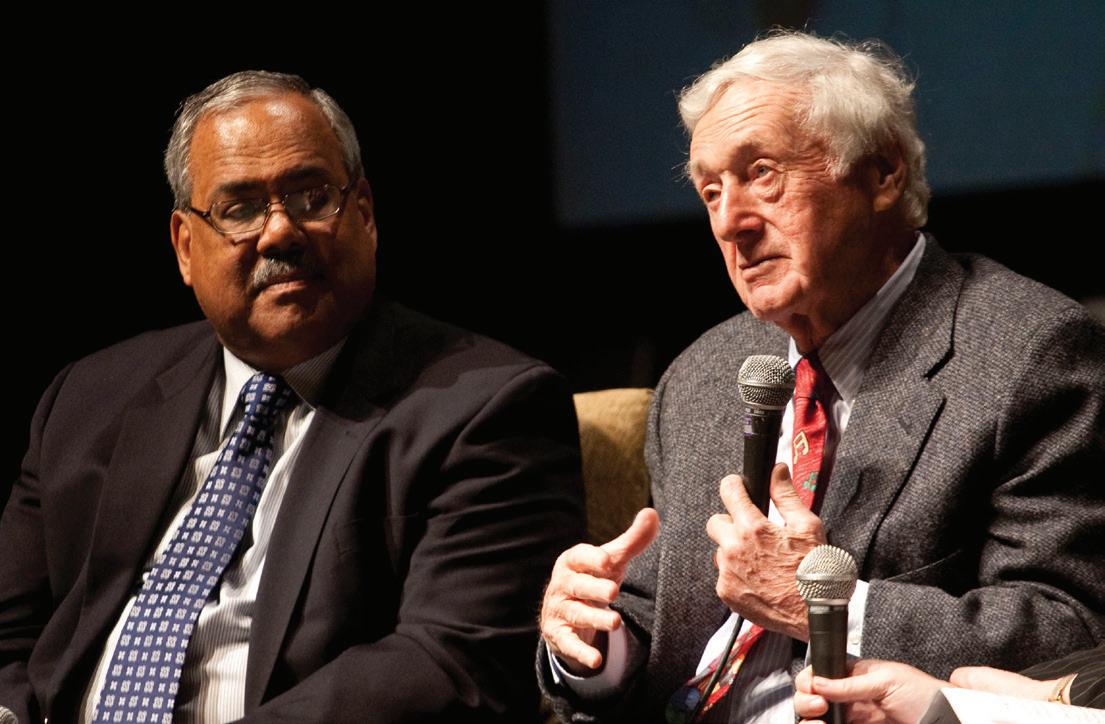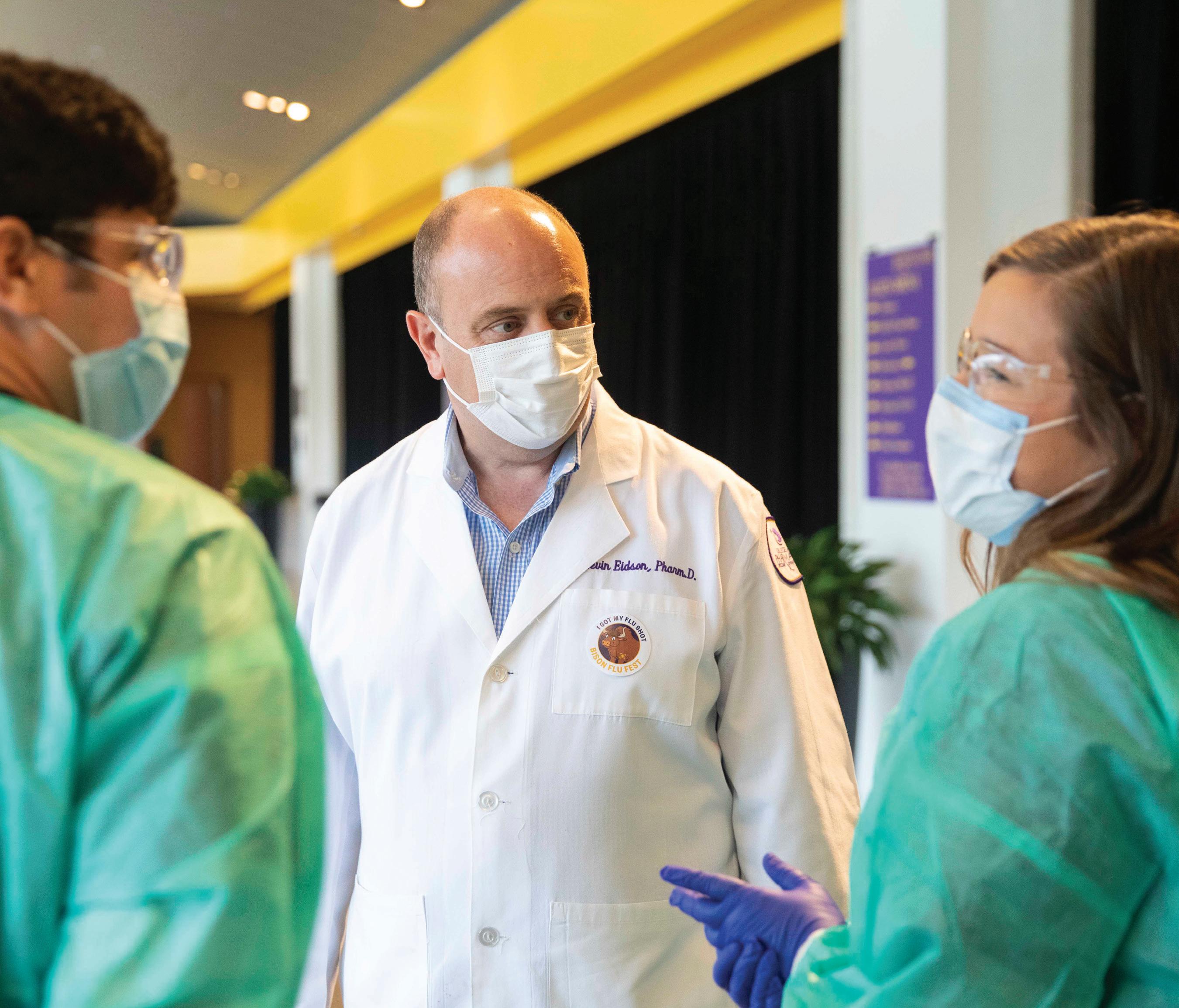
6 minute read
Respect leads the journey
As the eyes and hearts of the nation turned to issues of racial equity and justice this summer, Lipscomb University was not immune to difficult conversations about increasing ethnic diversity and diversity of thought on its campus.
Although Lipscomb’s past cannot be changed, the leaders of the institution today know we are on a journey—not yet complete by any means—but a journey moving toward being a better, more respectful, more diverse and more inclusive institution.
As an academic institution preparing students for a working world that has rapidly become ever more diverse and global over the past few decades, Lipscomb’s primary academic objective is to be a place where diversity, inclusion and cultural competency are intentionally woven into all aspects of its community, said Lipscomb President L. Randolph Lowry. In fact, that goal is not only crucial to the university’s accreditation status but to Lipscomb’s longstanding Christian mission as well, Lowry said.
Within the past 15 years, Lipscomb has worked hard to bring a diversity of voices and experiences to students as well as to enhance diversity within the student body through programs such as the Hispanic Achievers University Grants program, the Veterans Scholars Initiative, the Conversations of Significance guest speaker initiative and an enhanced Global Learning program, among others.

In 2016, Taegen Martin, completed the Igniting the Dream of Education and Access at Lipscomb (IDEAL) program, a certificate program that provides education and workplace training to students with intellectual and/or developmental disabilities.
Photo by Kristi Jones
In 2016-17, an important step on the journey was taken with the establishment of the Respect Leads initiative. A committee was created to generate ideas for promoting a culture of respectfulness in all quadrants of the university and to identify specific initiatives that the university might undertake leading toward a more respectful university climate. The Respect Leads committee identified a set of core factors associated with our understanding of what it means to be respectful.
Since then, the university has held respect-themed chapel programs, incorporated activities designed to build empathy into curriculum and extracurricular programming, offered student events and promotional initiatives to spur conversation among students and their friends and family, and hosted additional efforts.
Lipscomb’s LIGHT program, an academic intercultural competence initiative, began its academic programming and infusion of cultural aptitude into the general education curriculum in 2017. Ethnic diversity of faculty, executive leadership and staff who deal directly with student life has been increased, and the Office of Intercultural Development has provided mandatory diversity training to members of the student staff for fall orientation since 2018.
In 2020, the university has added a new task force, Respect Leads: Lipscomb’s Council on Diversity & Inclusion, charged to further the promotion of a culture of respectfulness throughout campus, to provide counsel to university administrators and to lead actions and activities regarding initiatives focused on diversity, inclusion, equity and community engagement.

In the 2009-2010 school year, a former Nashville vice mayor, the late Howard Gentry (left) and the late John Seigenthaler (right), Tennessean publisher and eyewitness to the civil rights movement while working for Robert F. Kennedy, spoke to students.
Photo by Kristi Jones
William Turner, special counsel to the president for diversity and inclusion, a position that is part of Lipscomb’s executive leadership team, is the chair of the council, assisted by co-chairs Norma Burgess, associate provost for equity, diversity and inclusion, and Prentice Ashford, dean of community life. The 18-member council will advise university leaders on initiatives that Lipscomb plans to undertake in the next two years to enhance and further develop a more respectful university climate.
Agenda items in 2020-21 for the council include:
• Issuing a regular newsletter updating the Lipscomb community on diversity issues;
• Developing an annual report on diversity with the first edition in 2021;
• Leading efforts for regular campus climate surveys with the first survey planned for spring 2021;
• Creating an open conversation path with the Lipscomb Black Alumni Council and other alumni of color;
• Hosting Respect Leads events and activities that foster a welcoming community and advance diversity and inclusion on campus; and
• Providing leadership for a comprehensive diversity and inclusion website.

Lipscomb Academy holds its Cultural Fair annually, highlighting and informing about the cultural heritage of the minority students who make up 19 percent of the lower school enrollment.
Submitted Photo
“While the year 2020 has shown our nation has a long way to go toward racial equity, here at Lipscomb, we’re trying to create a community that God would recognize as representing His creation,” said Lowry. “We are not always completely successful in that endeavor, but as an institution devoted to educating the next generation of Christian leaders, we gladly accept the responsibility to strive to figure out how to take a Christian approach to all humankind and educating students to be successful and effective in an increasingly diverse world.”
For more information on diversity at Lipscomb, log on to lipscomb.edu/diversity.
Respect Leads: Lipscomb's Council on Diversity & Inclusion 2020 members
William Turner, Chair, Special Counsel to the President for Diversity and Inclusion
Norma Burgess, Co-Chair, Associate Provost for Equity, Diversity and Inclusion
Prentice Ashford, Co-Chair, Community Life, Dean

In 2016, the Fred D. Gray Institute for Law, Justice & Society was named for Gray, a history-making civil rights era attorney who partners with Lipscomb on various projects.
Photo by Kristi Jones
Beki Baker, College of Entertainment & the Arts, Theatre Chair
Rebecca Clark, College of Liberal Arts & Sciences, Social Work Chair and Associate Professor
Kirsten Dodson, Raymond B. Jones College of Engineering, Assistant Professor
David Fleer, College of Bible & Ministry, Director of Christian Scholars Conference and Professor
Chris Gonzalez, College of Liberal Arts & Sciences, Marriage & Family Therapy Program Director and Associate Professor
Julie Harston, Beaman Library, Assistant Librarian
David Holmes, College of Liberal Arts & Sciences, Dean and Professor
Cori Mathis, LIGHT Program, Director Florah Mhlanga, College of Liberal Arts & Sciences, Associate Dean and Professor
Kam Nola, College of Pharmacy Professor
Alfa Nyandoro, College of Computing & Technology, Information Technology Chair and Associate Professor
Lauren Pinkston, College of Business, Assistant Professor
Juan Reveles, Student Life, International Student Life Coordinator
Julie Simone, College of Education, Instructor
Michelle Steele, College of Leadership & Public Service, Leadership and Public Service and Urban Studies Program Director and Associate Professor
Al Sturgeon, Student Life, Vice President and Dean
DeAndrea Witherspoon-Nash, College of Liberal Arts & Sciences, Assistant Professor
Rebecca Zanolini, Global Learning Director

The LIGHT program, an academic intercultural competence initiative, featured American book award-winner Thi Bui in February.
Photo by Kristi Jones
Lipscomb Black Alumni Council welcomes all who embrace diversity and inclusion
There is no doubt it has been a year of hardship so far. But in hardship, we Bisons pull together.
Given the tragic national events earlier this year, more people than ever before are looking for ways to stand together and embrace inclusion, diversity and a better world. The Lipscomb Black Alumni Council (LBAC) wants those people to know that it can be a valuable conduit to carry out that vision on the Lipscomb campus, said Pat Bethel (’72), chair of the LBAC board of directors.
Kicked off in November 2018, LBAC has almost 1,000 registered members and is open to anyone, of any ethnicity, who is committed to supporting diversity, inclusion and participation in the life of Lipscomb University, she said.
“You don’t have a voice in the university if you are not engaged,” said Bethel. “There is so much good for today’s students that can come from alums who had the experience of being a minority at Lipscomb in the past.

Diversity among the full-time faculty has increased to 10.3% in 2020.
Photo by Kristi Jones
“It is important for all of today’s students to understand the importance of inclusion. Lipscomb wants to be an even more inclusive and welcoming organization, and any alum can be a part of making the university even better,” she said.
LBAC focuses on programming that supports black students and alumni to help strengthen their faith; excel in academic, social and cultural endeavors; acquire life skills required to successfully transition from college to post-college life; and develop networks that contribute to education and career advancement.
A monthly LBAC newsletter is sent to all registered black alumni as well as those who are interested in supporting the mission. It doesn’t take any more than an email to LBAC@alumni.lipscomb.edu to start a dialogue with fellow alumni who share similar values and passions.
If you would like to donate to student scholarships offered through LBAC in 2021, go to bit.ly/ BethelScholarship2020.






